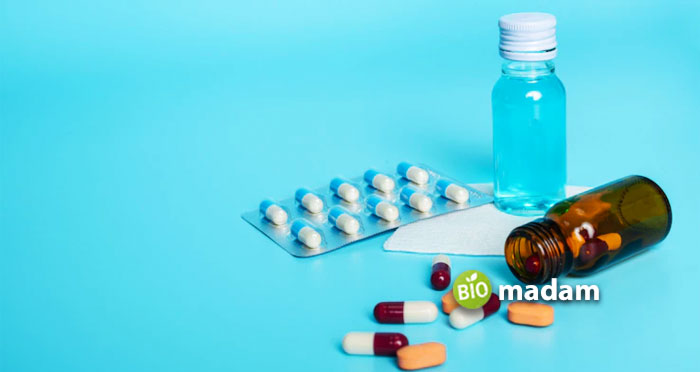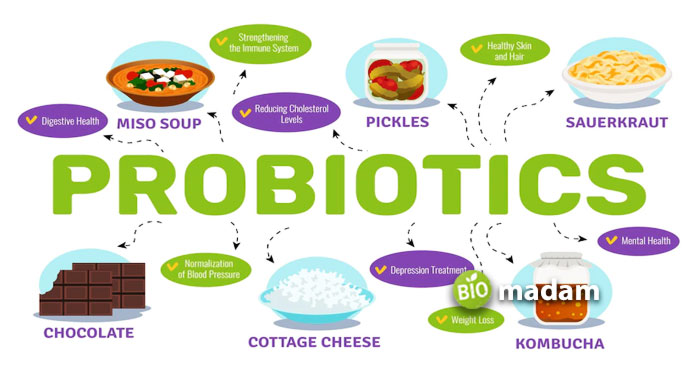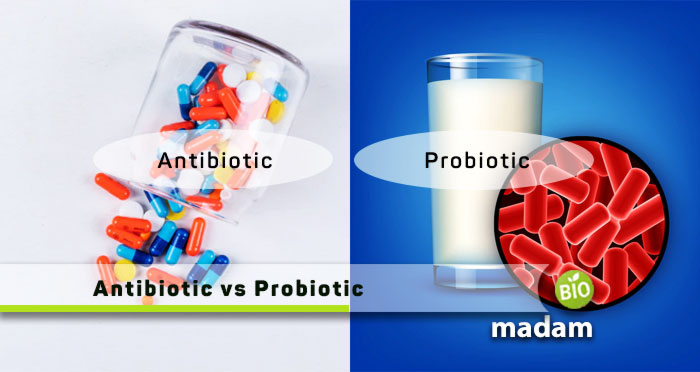Recently updated on March 7th, 2023 at 10:20 am
The most critical difference between antibiotics and probiotics is that antibiotics kill microbes, whereas probiotics are friendly microbes.
Antibiotics and probiotics are both essential for our health and are used per need. We usually use antibiotics to kill different types of bacteria. Yet, all bacteria are not harmful. Probiotics are naturally occurring bacteria in the body that help keep your gut healthy. They are also known as gut-friendly bacteria.
While bad bacteria are not welcome by your body cells, probiotics live in your body and help fight diseases.
Comparison Table
| Characteristic | Antibiotic | Probiotic |
| Meaning | Anti: against, bio: life | Pro: for, bio: life |
| Definition | Drugs killing harmful bacteria | Friendly bacteria in the gut |
| Types | Penicillins, cephalosporins, tetracyclines, sulfonamides, etc. | Lactobacillus plantarum, Lactobacillus brevis, etc. |
| Mechanism of Action | Bacteriostatic/bacteriolytic | Destroys bacteria through its secretions |
| Examples | Amoxicillin, tetracycline | Yogurt, kimchi, sour pickles |
What are Antibiotics?
Antibiotic refers to something that is against life. Anti means against, while bio means life. In medical terms, antibiotics are medicines used to treat diseases or infections by killing unwanted microorganisms. They usually work on bacteria and do not treat diseases caused by viruses. Antibiotics often kill the healthy bacteria in your body, leading to GI issues like diarrhea and vomiting.
Antibiotics help treat multiple diseases, yet you must not use them without a doctor’s prescription. The doctor gives you an antibiotic according to your condition and the type of bacteria causing the ailment. Broad-spectrum antibiotics must only be used when needed or may lead to antibiotic resistance. After some time, these drugs do not help eliminate those bacteria because they do not work on them anymore. Also, do not use antibiotics to clear an allergic reaction as it has other effective treatments.
Uses of Antibiotics
As you know, antibiotics kill bacteria to get them out of your system and treat a condition. However, you must not take them like candies. Physicians suggest taking symptomatic medicines until the need for antibiotics arises. Here’s when you should take an antibiotic for an infection:
- It does not go away with other medicines
- It would take a lot of time to clear without antibiotics
- May infect others if not treated in time
- May cause further complications without proper treatment
- It might occur without a prophylactic antibiotic dose

What are Probiotics?
Pro means for, and bio means life. It suggests that probiotics are for life or promote living. Medically, probiotics refer to a set of microorganisms in your body (especially the gut) that help normal bodily functions. They make up your microbiome and fight off harmful bacteria in their capacity. Your microbiome is not restricted to your gut only. The trillions of microbes are present all over your body. Various bacteria, archaea, viruses, fungi, protozoans, and parasites make up this friendly-microbe system in the body. No two humans have an identical biome. Not even parents and children or twins.
As all bacteria are not good or bad, how do you know which bacteria are good for your health?
Probiotics are isolated from humans and survive in the small and large intestines. They are safe to consume with scientifically proven benefits. Bacteria or microbes with all these characteristics are probiotics and make your microbiome.
Uses of Probiotics
While the main role of probiotics is to support your immune system and keep harmful bacteria away, they are involved in a few extended functions. Taking sufficient probiotics helps keep your gut healthy and improves overall health. Some of the uses of probiotics include:
- Producing vitamins
- Breaking down and absorbing medicines
- Maintaining a balance of bacteria in the gut
- Killing some of the disease-causing bacteria to avoid getting sick
- Acting on bacteria when you ingest them through food or drinks

Difference Between Antibiotic and Probiotic
Literal Meaning
Antibiotic
Anti means against, and bio means life.
Probiotic
As opposed to antibiotic, probiotic means for life (pro means for, bio means life)
Definition
Antibiotic
Antibiotics are drugs that kill disease-causing microbes in your body. Specific antibiotics are used for particular bacteria.
Probiotic
Contrarily, probiotics are friendly bacteria in your gut that fight harmful bacteria you ingest.
Types
Antibiotic
There are seven major classifications of antibiotics; penicillins, cephalosporins, macrolides, fluoroquinolones, tetracyclines, sulfonamides, and aminoglycosides.
Probiotic
Alternatively, three strains of probiotics are commonly used; Lactobacillus plantarum, Leuconostoc mesenteroides, and Lactobacillus brevis.
Mechanism of Action
Antibiotic
Antibiotics work by bacteriostasis or bacteriolysis. They may inhibit the activity of the disease-causing bacteria or kill them.
Probiotic
On the other hand, probiotics either kill the bacteria or regulate the immune system by secreting acids like lactic acid.
Examples
Antibiotic
Common examples of antibiotics include amoxicillin, tetracycline, gentamicin, etc.
Probiotic
Foods like yogurt, kimchi, fermented tea, sour pickles, and kombucha contain natural probiotics to support gut health. Besides, yogurt is also helpful in relieving constipation.
The Bottom Line
Probiotics and antibiotics are crucial for life. A major difference between antibiotics and probiotics is that the former kills bacteria while the latter is healthy microbes. Antibiotics kill disease-causing bacteria in the body. On the contrary, gut-friendly bacteria (probiotics) support the immune system and destroy harmful bacteria in their capacity. You may take probiotics through foods like yogurt or supplements. You must take antibiotics only by prescription. Irrational use of antibiotics can cause antibiotic resistance.
FAQs
Should I take probiotics or antibiotics?
Probiotics may help eliminate bacteria, but they cannot kill all of them. You will need antibiotics for some microbes. Doctors suggest taking probiotics a few hours after antibiotics to replenish any probiotics in the gut killed by antibiotics. A few physicians may also recommend probiotics a few days after beginning the antibiotic course. However, do not take them immediately after the other as they may cancel the effect.
Can I take probiotics instead of antibiotics?
Probiotics are not a substitute for antibiotics. Yet, they have proved to help maintain a healthy bacteria gut level. They act as adjuvant therapy by reducing the side effects of antibiotics and supporting immune function.
How to take probiotics with antibiotics?
Probiotics do not have a particular dose as they are not FDA-regulated like other drugs. Yet, 1 to 20 billion CFUs per day of Lactobacillus rhamnosus and 250 mg and 500 mg Saccharomyces boulardii per day have proved to be helpful. You may also take them naturally from yogurt, sauerkraut, etc.

Anna has completed her degree in Pharmacy from the University of Hawaii. She is serving as a research assistant in a pharmaceutical company. She had a great interest in writing blogs, traveling to different parts of the US, and trying delicious recipes in her spare time.

